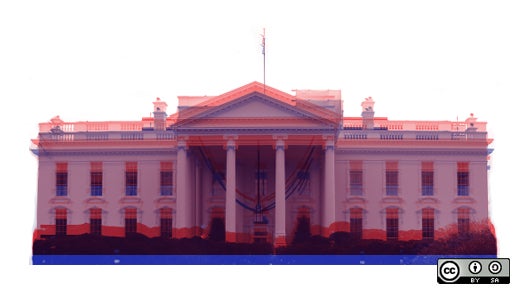Dave Cole, Senior Advisor to the CIO of the Executive Office of the President, presented an awesome keynote to more than 3,000 attendees at DrupalCon San Francisco 2010 on April 21. His keynote was about open source in government, and he talked about how whitehouse.gov has become a platform to foster citizen participation. Although I found the technology part interesting, it was the philosophy and open source principles that Dave talked about that are enabling the executive branch of the United States government to be more open and transparent.
How is this change happening? It's no secret that the Obama administration is about change. I think it's safe to say, one of the main philosophies of this administration is that change coming from the bottom up is embraced rather than smothered.
Cole said, “Change comes from the bottom-up. Ordinary people get together to achieve extraordinary things. In political advocacy we called it community organizing. Here in development, we call it open source. I think that's the fit.”

Dave Cole delivers open source in government keynote, photo by Jason Hibbets
This mentality directly aligns with principles of the open source way like sharing, meritocracy, and community. Bottom-up initiatives, like community organizing, aren't new concepts. This approach is embraced because it's more effective than top-down directives. The participants who opt into community-organized initiatives are more passionate, committed, and driven.
One way this change is happening is with more transparency. The whitehouse.gov site runs on Drupal, an open source content management system, and provides a platform with user features like a briefing room, blogs, special features, and live video. Cole rhetorically asked what Drupal can do for government. The response: It's helping to drive the open government and open data movements because the nature of open source fits nicely with open government initiatives like being more transparent to citizens.
A new way this change is happening was announced during the keynote. Cole said that consuming open source is only half of what it means when participating in a community. To complete the other half, you have to give back and contribute. Cole was proud to announce that whitehouse.gov is starting their code contributions to the Drupal community.

Dave Cole announces contributions to the Drupal community, photo by Jason Hibbets
This reminds me of when Jim Whitehurst, Red Hat CEO, was talking about the influence of consumers of open source technology in his 2009 State of the Union at Red Hat. One of his points was to consume and contribute. If you think about it, there's more to gain. The more open source technology that is consumed, the better it becomes. The more contributions that go back into the technology, the benefits increase exponentially. If the cycle isn't completed, the full benefits aren't gained.
Cole said a similar thing: “It's the idea that if we can solve the problem once, right, we can expand that and iterate upon it rather than having to keep reinventing the wheel every time.” And that's what they're doing. By giving back, whitehouse.gov is contributing to the community that enabled them to be more transparent and open. Their contributions will be enhanced with increased adoption, and others will benefit because they won't have to build new wheels. Users can modify the contributions to meet their needs and it becomes more accepted with widespread adoption. This not only benefits all citizens, but other consumers like government agencies.
When a government is more open about policies and initiatives; when a nation's leadership is more transparent about their agenda; and when a government solicits citizen feedback to crowdsource ideas and try to solve big problems, citizens win. This is how government should be.
Cole concluded his keynote with a simple challenge: What changes do you want to see in government? In other words, I think it's awesome that the Obama administration has an open source mentality that is driving change in Washington. But what good is making government more open and transparent if the citizens choose not to participate and hold governments accountable for their actions?






8 Comments